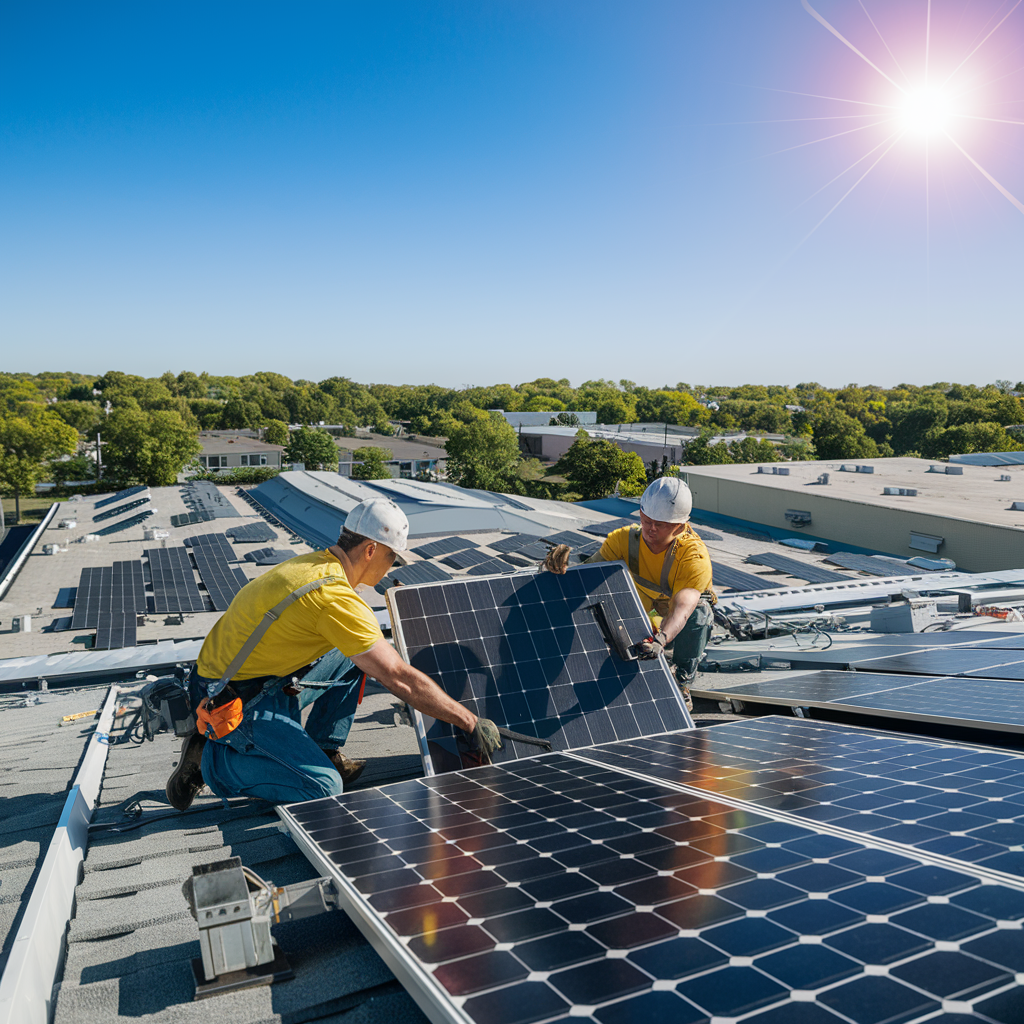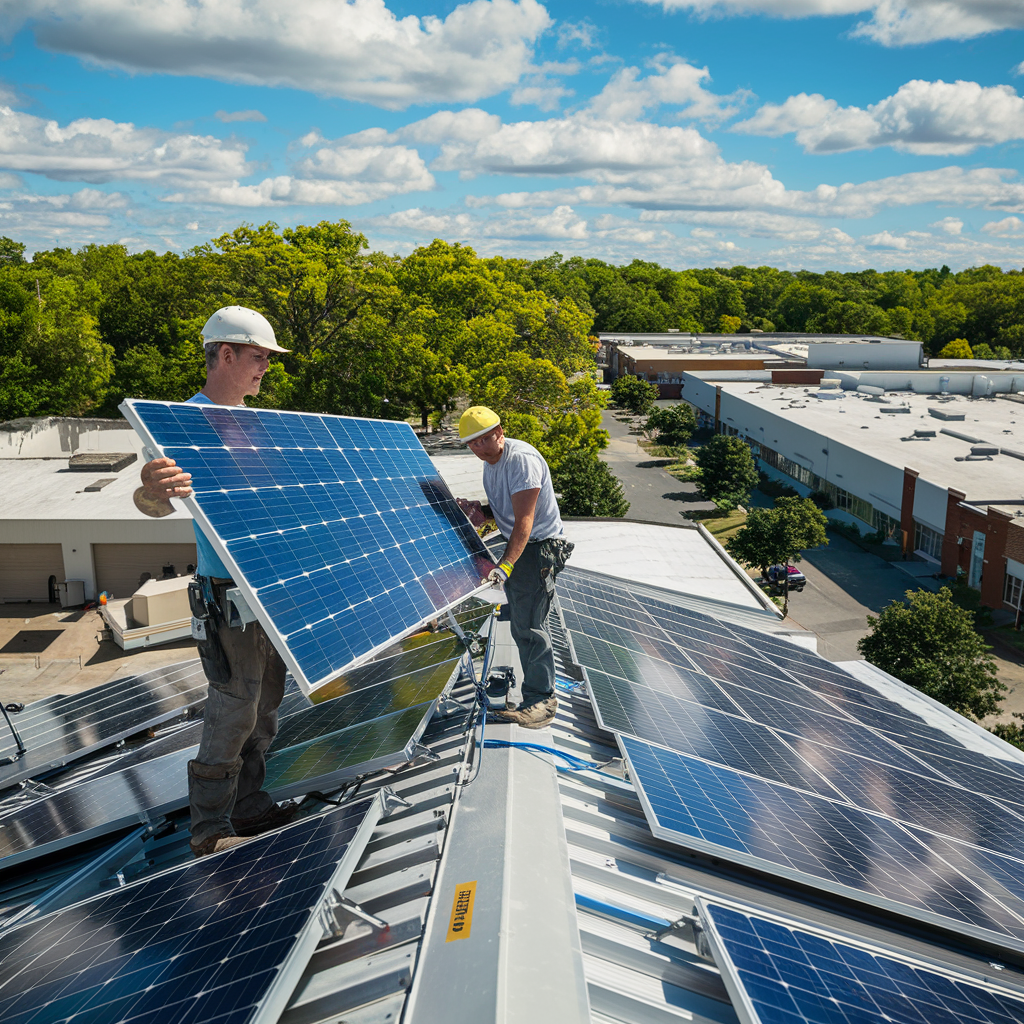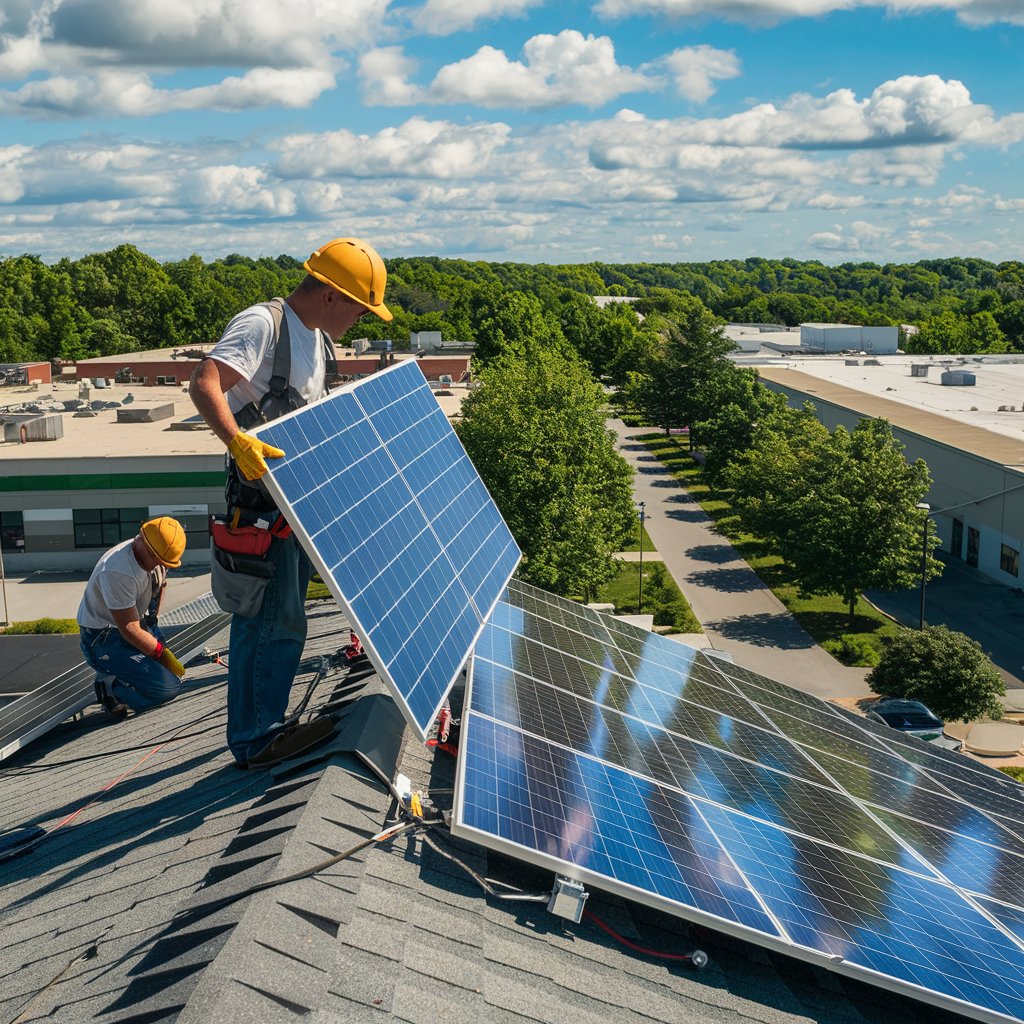
Solar Solutions for Business: Your Guide to Commercial Solar Installation
In today’s evolving landscape of sustainable energy solutions, the integration of solar panels in commercial roofing has garnered significant attention for its myriad benefits and strategic advantages. However, what lies beyond the surface of cost savings and environmental impact is a complex realm of considerations and industry nuances that demand careful navigation and informed decision-making. As businesses seek to embrace solar power on a commercial scale, understanding the intricacies of system selection, installation intricacies, and long-term implications becomes paramount for success in this transformative energy landscape.
Key Points In This Article
- Commercial solar panels offer significant cost savings and environmental benefits.
- Different types of systems cater to various business needs and preferences.
- Factors like installation complexity and energy requirements impact overall costs.
- Incentives, trends, and customization options enhance the value and efficiency of commercial solar panels.
Benefits Of Commercial Solar Panels
 Implementing commercial solar panels offers businesses significant cost savings and demonstrates a strong commitment to sustainability. By harnessing solar power for their energy needs, companies can reduce their reliance on traditional grid electricity, leading to substantial cost savings over time. This shift towards renewable energy sources not only helps businesses save money but also showcases their dedication to environmental sustainability by reducing their carbon footprint.
Implementing commercial solar panels offers businesses significant cost savings and demonstrates a strong commitment to sustainability. By harnessing solar power for their energy needs, companies can reduce their reliance on traditional grid electricity, leading to substantial cost savings over time. This shift towards renewable energy sources not only helps businesses save money but also showcases their dedication to environmental sustainability by reducing their carbon footprint.
In addition to the financial benefits and sustainability aspects, adopting commercial solar panels provides businesses with a competitive edge in the market. Companies that prioritize green initiatives and invest in renewable energy solutions often attract eco-conscious customers who prefer to support environmentally responsible businesses. This can enhance brand reputation and customer loyalty, setting businesses apart from competitors who have not yet embraced solar energy generation.
Furthermore, the energy generation from commercial solar panels enables businesses to become more self-sufficient and less vulnerable to fluctuations in energy prices. By producing their own electricity on-site, companies can stabilize their operational costs and insulate themselves from potential increases in utility rates. This autonomy in energy production empowers businesses to take control of their energy consumption and future-proof their operations against rising energy expenses.
Types Of Commercial Solar Panel Systems
Commercial buildings utilize various types of solar panel systems to meet their energy needs efficiently and sustainably. Grid-tied solar systems are common, allowing excess energy to be fed back into the grid. Off-grid solar systems provide energy independence for remote properties without access to the main grid. Hybrid solar systems combine grid-tied and off-grid elements for reliable power supply. Building-integrated photovoltaics offer seamless integration into the building’s structure for aesthetic appeal. Ground-mounted solar systems are ideal for properties with ample land space, enabling efficient energy generation.
| Solar Panel System Type | Description |
|---|---|
| Grid-tied solar systems | Connect to the grid, allowing excess energy to be sold back to the utility company. |
| Off-grid solar systems | Provide energy independence, suitable for remote commercial properties without grid access. |
| Hybrid solar systems | Combine grid-tied and off-grid components for a consistent power supply in various conditions. |
| Building-integrated photovoltaics | Seamlessly integrate solar panels into the building’s structure, enhancing aesthetics and energy efficiency. |
| Ground-mounted solar systems | Ideal for properties with sufficient land space, enabling efficient solar energy production on the ground. |
Factors Impacting Commercial Solar Panel Cost
The cost of commercial solar panels varies significantly based on factors such as building size, installation complexity, and the required number of panels. When considering the installation of solar panels for commercial buildings, the following factors play a crucial role in determining the overall cost:
- Installation Complexity: The complexity of the installation process can significantly impact the cost of commercial solar panels. Factors such as roof condition, access to sunlight, and structural modifications required for installation can all affect the final price.
- Energy Needs: The energy requirements of a commercial building play a critical role in determining the number of panels needed for installation. Businesses with higher energy needs will require a larger number of panels, leading to increased costs for the system.
- Tax Incentives and Energy Savings: Tax incentives provided by government bodies and the long-term energy savings from using solar panels can help offset the initial installation costs. Businesses should consider these incentives and potential savings when evaluating the overall cost of installing commercial solar panels.
Getting accurate estimates from reputable commercial solar contractors is essential in understanding the true cost of installation and maximizing the benefits of transitioning to solar energy.
Installation Process For Commercial Solar Panels
 An essential step in transitioning to solar energy for businesses involves assessing the site and conducting an energy audit before proceeding with the installation of commercial solar panels. The site assessment and energy audit help determine the feasibility and efficiency of installing solar panels, considering factors like sunlight exposure and energy consumption patterns. Once the assessment is complete, the next phase involves system design, where the array size, location for installation, and types of panels are specified based on the site evaluation for the different types of commercial roof systems.
An essential step in transitioning to solar energy for businesses involves assessing the site and conducting an energy audit before proceeding with the installation of commercial solar panels. The site assessment and energy audit help determine the feasibility and efficiency of installing solar panels, considering factors like sunlight exposure and energy consumption patterns. Once the assessment is complete, the next phase involves system design, where the array size, location for installation, and types of panels are specified based on the site evaluation for the different types of commercial roof systems.
The installation process for commercial solar panels includes mounting the panels on rooftops or the ground, setting up inverters for converting solar energy into electricity, and integrating the system with the grid to enable power distribution. It is crucial to follow industry best practices during installation to ensure the system operates optimally.
Maintenance plays a vital role in the longevity and performance of commercial solar panels. Regular commercial roof inspections, cleaning, and upkeep are necessary to address any issues promptly and maximize energy production. By progressing through stages from site assessment to maintenance, businesses can achieve a smooth and efficient transition to solar energy, reaping the benefits of cost savings and environmental sustainability.
Incentives For Commercial Solar Panel Installation
To incentivize the installation of solar panels for businesses, various financial benefits and programs are available at both federal and local levels. These incentives can significantly offset the initial investment costs and provide ongoing financial advantages for commercial entities looking to adopt solar energy solutions. Here are some key incentives for commercial solar panel installation:
- Tax Credits: The Investment Tax Credit (ITC) offers a substantial 26% tax credit for businesses that invest in solar panel installations, reducing the overall cost of the project and providing a direct financial benefit.
- State and Local Incentives: Businesses can benefit from additional incentives at the state and local levels, such as rebates and grants, which further lower the upfront costs associated with installing commercial solar panels, making the transition to solar power more financially viable.
- Accelerated Depreciation: Accelerated depreciation policies allow businesses to recover the costs of their solar panel investments over a shorter period, providing a quicker return on investment and improving the overall financial outlook of solar projects.
Moreover, Solar Renewable Energy Credits (SRECs) and net metering programs offered by utility companies can provide additional revenue streams and energy-saving opportunities for businesses that choose to integrate solar power into their operations. By taking advantage of these incentives, businesses can not only reduce their environmental impact but also enhance their financial performance through sustainable energy practices.
Best Practices For Commercial Solar Panel Maintenance
Regularly cleaning and monitoring solar panels is essential for optimizing energy production and extending their lifespan in commercial settings. Commercial solar panel maintenance plays a crucial role in ensuring optimal system performance and maximizing cost savings for businesses. Studies show that regular cleaning can boost energy production by up to 20%, highlighting the direct impact of maintenance on overall efficiency.
In addition to cleaning, inspecting and monitoring inverters is vital to identify any issues promptly and maintain peak performance levels. Implementing proactive maintenance measures is key to extending the lifespan of commercial solar panels and preventing unexpected downtime. Early detection of potential problems through consistent monitoring can also help businesses avoid costly repairs in the future.
One of the significant advantages of commercial solar panels is their low maintenance requirements, contributing to long-term cost savings for businesses. By investing in routine maintenance and monitoring, companies can ensure that their solar panel systems operate at maximum efficiency, translating into significant financial benefits over time. Proactive maintenance not only safeguards the investment in solar panels but also supports sustainable business practices and energy independence.
Trends In Commercial Solar Panel Technology
With advancements in commercial solar panel technology, efficiency and performance have significantly improved. This evolution in solar panel technology has brought about exciting trends that are shaping the future of commercial solar installations:
- Bifacial Panels: One notable innovation includes the introduction of bifacial solar panels. These panels have the unique ability to capture sunlight from both sides, increasing energy yield and efficiency compared to traditional single-sided panels.
- Energy Storage Solutions: Another trend gaining traction in the commercial solar sector is the adoption of energy storage solutions, such as batteries. These solutions enable businesses to store excess energy generated during peak sunlight hours for later use, enhancing overall energy utilization and grid independence.
- Tracking Systems: Commercial solar installations are increasingly incorporating tracking systems to optimize sunlight exposure throughout the day. These systems adjust the orientation of solar panels to follow the sun’s path, maximizing energy generation and overall system efficiency.
These trends in solar panel technology, efficiency improvements, the integration of bifacial panels, energy storage solutions, and tracking systems are driving the commercial solar industry towards greater sustainability, cost-effectiveness, and energy independence. Businesses that stay abreast of these advancements can position themselves for long-term success in harnessing the power of solar energy.
Considerations For Customizing Solar Systems
Advancements in commercial solar panel technology have prompted a shift towards customizing solar systems to meet specific energy requirements and spatial constraints of commercial buildings. When customizing solar panel systems for commercial buildings, factors such as roof orientation, shading, and structural integrity must be carefully considered. Optimizing panel placement is crucial to maximize sunlight exposure and energy production efficiency. It is essential to tailor the system size and configuration to match the energy demand and budget requirements of the commercial property. Working with experienced solar professionals is key to designing and installing customized solar systems that are efficient and effective for commercial buildings.
| Consideration | Description |
|---|---|
| Roof Orientation | Ensure solar panels are placed to receive maximum sunlight exposure for optimal energy production. |
| Shading | Minimize shading from nearby structures or trees to prevent a decrease in energy production efficiency. |
| Structural Integrity | Assess the building’s structure to ensure it can support the weight of the solar panels securely. |
| System Size and Configuration | Customize the system size and layout to align with the energy demand and financial constraints of the property. |
Customizing solar systems for commercial buildings requires a meticulous approach that takes into account various considerations to ensure the system’s efficiency and effectiveness. By partnering with experienced solar professionals, businesses can design and implement customized solar solutions that meet their specific energy needs and spatial limitations.
Importance Of Trusted Solar Solutions Providers
Trusted solar solutions providers play a crucial role in ensuring the successful design, installation, and maintenance of industrial solar panel systems. These providers offer expertise in system design, installation, and ongoing support, ensuring a seamless transition to solar energy. Here are three key reasons why partnering with trusted solar solutions providers is essential for businesses looking to implement industrial solar panel systems:
- Enhancing the Business Case: Trusted solar solutions providers enhance the business case for industrial solar solutions by offering cost-effective and sustainable energy solutions. Their expertise in customization and integration helps businesses meet their unique energy demands efficiently.
- Maximizing Energy Production: By partnering with trusted providers, businesses can maximize energy production from their industrial solar panel systems. These providers offer tailored solutions to ensure optimal performance, helping businesses make the most out of their investment in solar energy.
- Meeting Energy Demands: Industrial operations have specific energy demands that require careful planning and precise installation. Trusted solar solutions providers understand these requirements and provide customized solutions to meet the energy needs of industrial and commercial settings effectively.
Final Thoughts
To sum up, commercial solar panels offer businesses a cost-effective and sustainable energy solution with numerous benefits. By understanding the various types of systems, factors influencing costs, installation processes, and maintenance requirements, businesses can make informed decisions to harness the power of solar energy. Collaborating with reputable solar technology providers and staying abreast of industry trends will be key to maximizing the advantages of commercial solar panel systems in the ever-evolving landscape of renewable energy.
Michael Overzat
Michael Overzat resides in Fort Smith, Arkansas with his wife and three kids. He enjoys to hike, skateboard, write, and get involved in charity organizations. He was originally born in Maryland. He has worked within the roofing industry for 5 years and is very active within the industry by attending conferences, masterminds, etc. His vision is to create a multi-state organization that has a customer centric model. He's worked for some of the biggest names in the industry and hopes to create a more people focused model for the roof replacement process.
